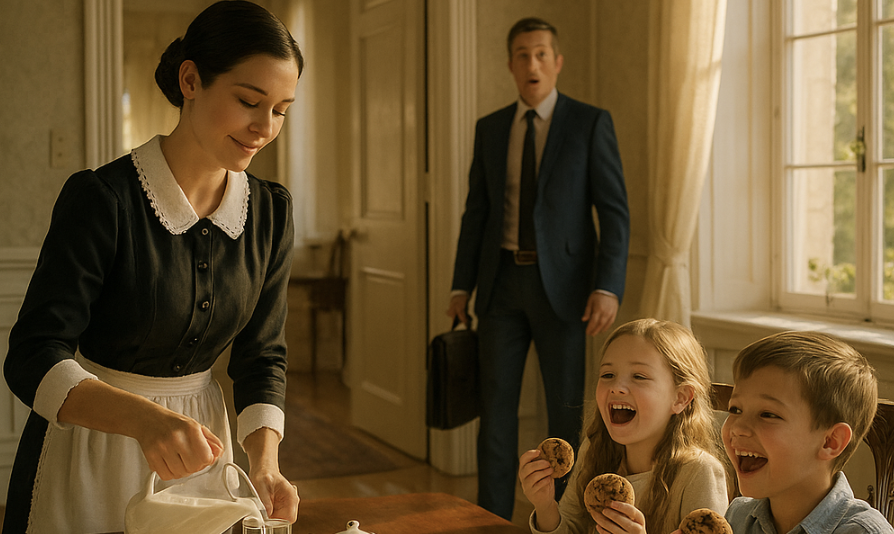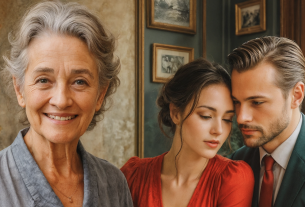The morning began like so many others for Adrian Cole—magnate of glass towers and velvet-lobbied residences—yet a faint, unfamiliar stir unsettled his routine. His calendar was jammed until nightfall, a gauntlet of negotiations and signatures. Still, a quiet insistence tugged at him, a whisper beneath the rational hum of his day: go home. Adrian wasn’t a man who veered from logic to follow a feeling. But on that day, the pull was impossible to ignore.
He couldn’t have known that turning his car toward home before dusk would reorder his life, strip away illusions, and point him toward what had always mattered most.
From the street, his mansion looked like triumph made tangible—sleek panes of glass catching the sun, a modern crown set high above the city. People saw its angles and envied its owner; they saw success and imagined happiness to match. Inside, the air was cooler, quieter. Years earlier, his wife, Clara, had died, and since then the house had drifted toward a polished kind of loneliness. He had two children, Ethan and Lily, and he had given them every luxury he could procure. What he failed to give, again and again, was himself.
The days consumed him—meetings, flights, calls, a constant throb of urgency—while his children learned to move softly through his success, like shadows skimming polished floors. The home had become a palace, all echo and gleam, tended by a maid named Rosa whose diligence kept the emptiness beautifully arranged.
Rosa had been with them nearly three years. Late twenties, gentle voice, she moved as if trying not to disturb the air. To Adrian, she existed at the edge of his attention: the person who made sure everything functioned without complaint. To Ethan and Lily, she was warmth in a human shape—a listener, a hand to hold, a smile that felt like daylight. Rosa carried her own grief quietly: she had once been a mother. A sudden, senseless accident had taken her only child. She spoke of it rarely, but sorrow lived in her eyes like a shore under water, visible when the light hit a certain way. With Ethan and Lily, though, something luminous flickered back to life; caretaking eased a wound she had expected to keep forever.
That afternoon, Adrian’s car swept up the drive, tires whispering over the stone. Sunlight lay in sheets across the marble steps. He pushed open the door, prepared for the hush he knew so well—the air conditioning’s soft exhale, distant household hums—and then he stopped. From the direction of the dining hall came laughter. Not polite laughter, not the brittle kind he heard at galas, but bright, unguarded peals, the sort that made rooms feel sunlit even in winter.
He followed the sound without meaning to, feet slowing as he reached the doorway. The sight undid him. Rosa stood beside the table in her emerald uniform, hair smoothed and tucked beneath her cap. Across from her sat Ethan and Lily, both beaming, cheeks flushed with excitement. Between them rested a chocolate cake, glossy with ganache and crowned with fruit and a cloud of cream. Rosa sliced with ceremony, sliding thick wedges onto plates while the children clapped and kicked their heels against their chairs.
Ethan’s blue shirt wore a dusting of cocoa like confetti; Lily’s pink dress bore a swipe of cream along the hem, evidence of small, eager hands in a kitchen too big for silence. They weren’t merely eating cake. They were marking a moment, building a memory brick by sweet brick. And Rosa wasn’t merely serving. She laughed with them, dabbed Lily’s cheek with a napkin, ruffled Ethan’s hair with affectionate ease—every gesture easy and sure, as if this were the most natural thing in the world.
Adrian pressed a hand to his mouth. Tears stung before he could stop them. It wasn’t the cake. It wasn’t the neat place settings or the chandelier’s gold shimmer over the scene. It was the density of love in the air—unaffected, generous, ordinary in the best way. Rosa, the woman he hardly noticed when he scanned an agenda or departed for the airport, had given his children the one thing he’d failed to offer in abundance: family.
Guilt rose like a tide. He had built portfolios and skylines, ring-fenced their future, filled closets and calendars—and missed the fact that two small hearts were starving for something money couldn’t purchase. Rosa had stepped into the emptiness, quiet and steadfast, and tended it with patience until it bloomed.
He thought of Clara. She used to tease that children needed presence more than presents. He’d laughed and promised, and then grief had come like a storm, and he had hidden from it inside his work. Standing there now, he could almost hear her—soft, amused, certain—reminding him that love lives in the smallest acts.
He didn’t enter at once. He watched as Ethan reenacted an epic mishap with a bag of flour—hands spread, eyes wide, the memory punctuated by Lily’s wheezy giggles. Rosa’s laughter joined theirs, low and bright. The cake was more than dessert; it was medicine. It was a bridge.
Finally, the moment broke him open. He stepped forward. The children twisted in their chairs, surprise replacing laughter. Rosa straightened, smoothing her apron as if an invisible inspector had arrived.
Words bottlenecked. When his voice came, it carried everything he had not said in years. “Thank you,” he managed—rough, honest, unfinished.
Rosa blinked, unsure. But Ethan and Lily understood before she did. They sprang toward him, small arms clamping around his legs, voices tumbling over one another as they tried to narrate the afternoon. He crouched and gathered them close, and the tears came without shame. It was the first time in years his children had seen their father cry. What they felt wasn’t fear. It was belonging.
In the days that followed, Adrian changed course. Not in promises, but in practice. He carved out hours where there had only been margins. He learned the rituals Rosa had created with them: measuring flour with patience, reading the same picture book twice because the second time mattered just as much, wandering the garden to count bees and name clouds. The mansion softened. The chill lifted. Noise arrived—laughter, thudding feet, the persistent, joyful chaos of real life.
And Rosa—quiet Rosa—surprised him. Beneath that composure lay a spine of steel and a heart resilient enough to hold both sorrow and hope at once. One evening, the four of them sat outside while the day faded to indigo and the lawn sparked with fireflies. The children chased pinpoints of light, shrieking softly like conspirators of joy. Rosa spoke then, voice level, eyes steady, and told him about the child she had lost. Adrian listened, not as a man fixing a problem but as a person witnessing another’s truth. Grief moved through the telling, but so did grace. He realized she had offered Ethan and Lily a mother’s kind of love, given not because the world was fair but because love refuses to stop at the edge of pain.
From that night, the word “family” stretched to include her.
Weeks blurred into a new normal. One afternoon, Adrian paused again at the dining room threshold. Music from the children’s classroom lesson chirped from a tablet; Ethan and Lily were teaching Rosa a ridiculous dance involving flapping elbows and exaggerated spins. The chandelier scattered warm light like confetti over the scene. Rosa laughed so hard she had to brace a hand on the table. Adrian felt something spacious open in his chest.
He thought back to the choice that had rerouted everything—the afternoon he turned the car toward home. He had expected silence. He found a celebration. He had expected emptiness. He walked into abundance.
The tears that gathered then were different from the first ones. Not grief, not guilt. Gratitude, clean and overwhelming.
Later, when the children finally collapsed in a tangle of blankets, Adrian stood with Rosa in the doorway, watching the easy rise and fall of sleeping shoulders. He looked at the woman who had quietly rescued his house from becoming a museum of success and helped return it to what Clara always wanted it to be: a place where love is the loudest sound.
“Thank you,” he said again, this time with all the words that sat behind it—thank you for seeing what I missed, for holding what I dropped, for teaching me how to be here.
Rosa shook her head, not in dismissal but in humility. “We all needed a home,” she said softly.
Adrian nodded. He finally understood. The greatest fortune he would ever steward was not walled in glass or labored into contracts. It sat at a table dusted with cocoa, ran barefoot through grass lit by fireflies, and laughed in a kitchen that smelled like warm cake.
Love, it turned out, was the only wealth that multiplies by being given away. And it had taken one simple decision—to come home—to show him the sum of everything.



